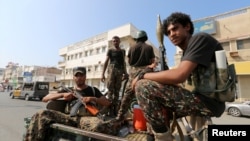Arab media is reporting that both the Saudi-led coalition and forces loyal to the Houthi militia group are starting to implement a redeployment agreement worked out by mediators in the Swedish capital, Stockholm, last December. Witnesses, however, say that they have not detected significant movement of forces.
Arab media reported scattered clashes in parts of Yemen Thursday, despite some reports that the warring sides had begun to implement a U.N.-sponsored redeployment in and around the Yemeni port city of Hodeida.
Optimism about the Hodeida agreement during a presentation by U.N. envoy Martin Griffiths to the Security Council several days ago created fresh hope about jump-starting the stalled plan for the country's largest port and lifeline to the capital, Sana'a.
"Since I last talked to you a few weeks ago, we have made some significant progress in the implementation of the agreements reached in Stockholm toward the latter part of year," said Griffiths. "The parties have now confirmed to Lt. Gen. Michael Lolesgard and to me their agreement for the first phase of the Hodeida redeployment plan."
Despite the official optimism, a spokesman for Yemen's internationally recognized government of President Abdrabbu Mansour Hadi told Arab media that his side would not start redeploying until the Houthi militia group evacuated the two smaller ports of Salif and Ras Aissa.
He says that the process of the government pullout (from its forward positions at) Kilometer 8 won't start until the first steps of the (Stockholm) agreement begin and the Houthi militiamen remove land mines and withdraw their forces from the ports of Ras Aissa and Salif.
Saudi-owned al-Arabiya TV reported that the U.N. has given the Houthis four days to withdraw from Ras Aissa and Salif and that Saudi-coalition forces would begin pulling back from parts of Hodeida that they control after the initial Houthi withdrawal. The TV channel indicated that the Houthis would have another 11 days to evacuate the port of Hodeida.
Ali Shaabi, a spokesman for the Houthis, told al-Hurra TV that some analysts in the capital, Sana'a, (now under Houthi control) were "skeptical" about implementing the agreement.
He says that there remain many obstacles on the ground before implementing the (Hodeida) agreement and that there are a number of issues still pending that should normally have preceded the pullout, including a cease-fire, which has not completely taken effect in order to allow the redeployment to begin.
Hilal Khashan, who teaches political science at the American University of Beirut, tells VOA that there has been an escalation of the conflict in Yemen in recent days, which does not bode well for a pullback in Hodeida.
"The rising military activity does not suggest that the two sides are about to reach terms or that the Houthis are going to pull out (from Hodeida)," said Khashan. "The Houthis are on the offensive on the border with Saudi Arabia. In recent days they have captured mountainsides ... hills on the Saudi side of the border. Saudi media reports say at least 16 (Saudi) soldiers were killed last week. This is the largest casualty toll (for the Saudis) since the beginning of the war."
Khashan argues that the Warsaw Conference on Iran (last week) "has complicated matters in Yemen" and that Tehran has been using its clout in Yemen with the Houthis — whom they support — to express their displeasure with the outcome of the international meeting in Poland.






